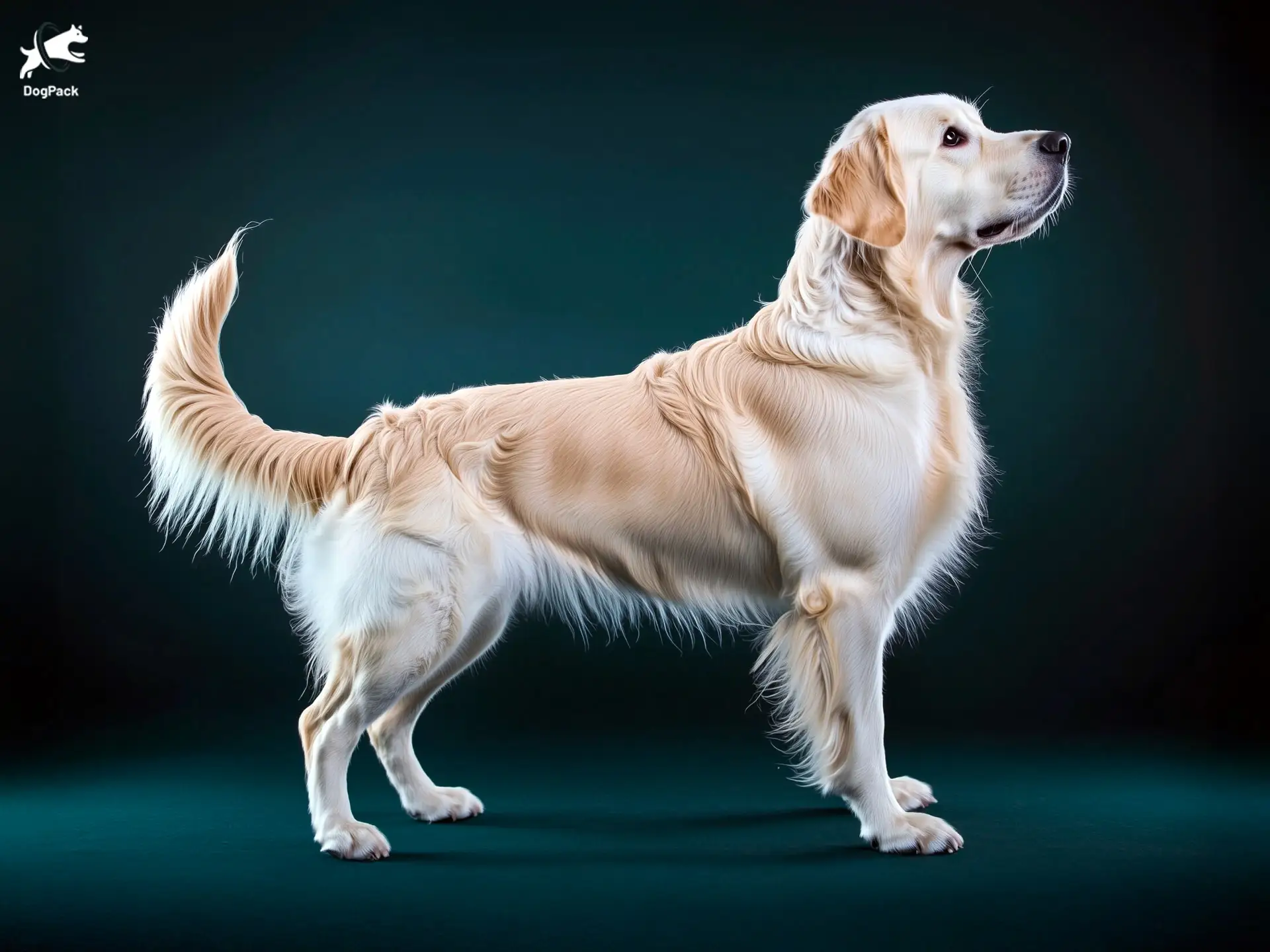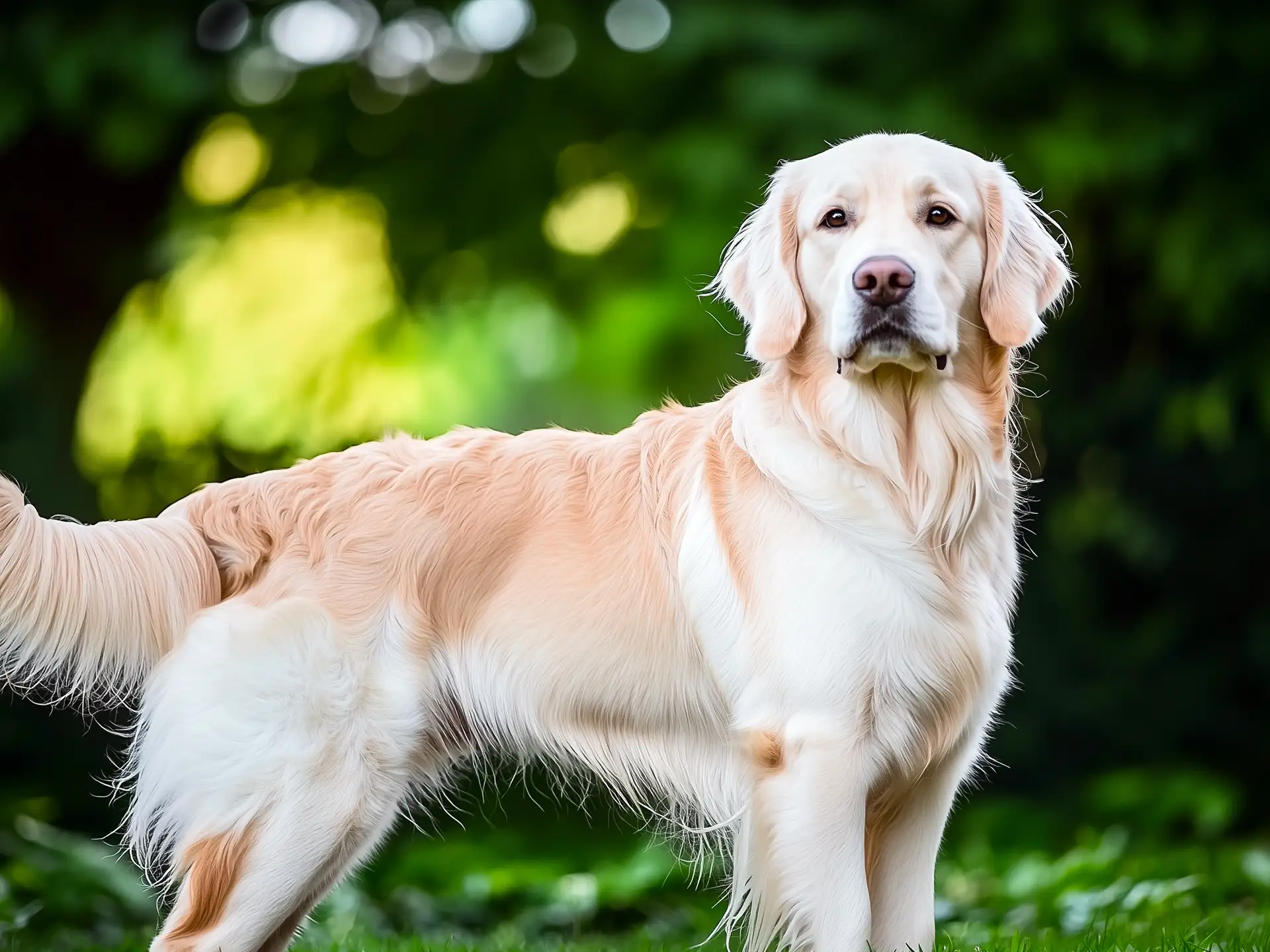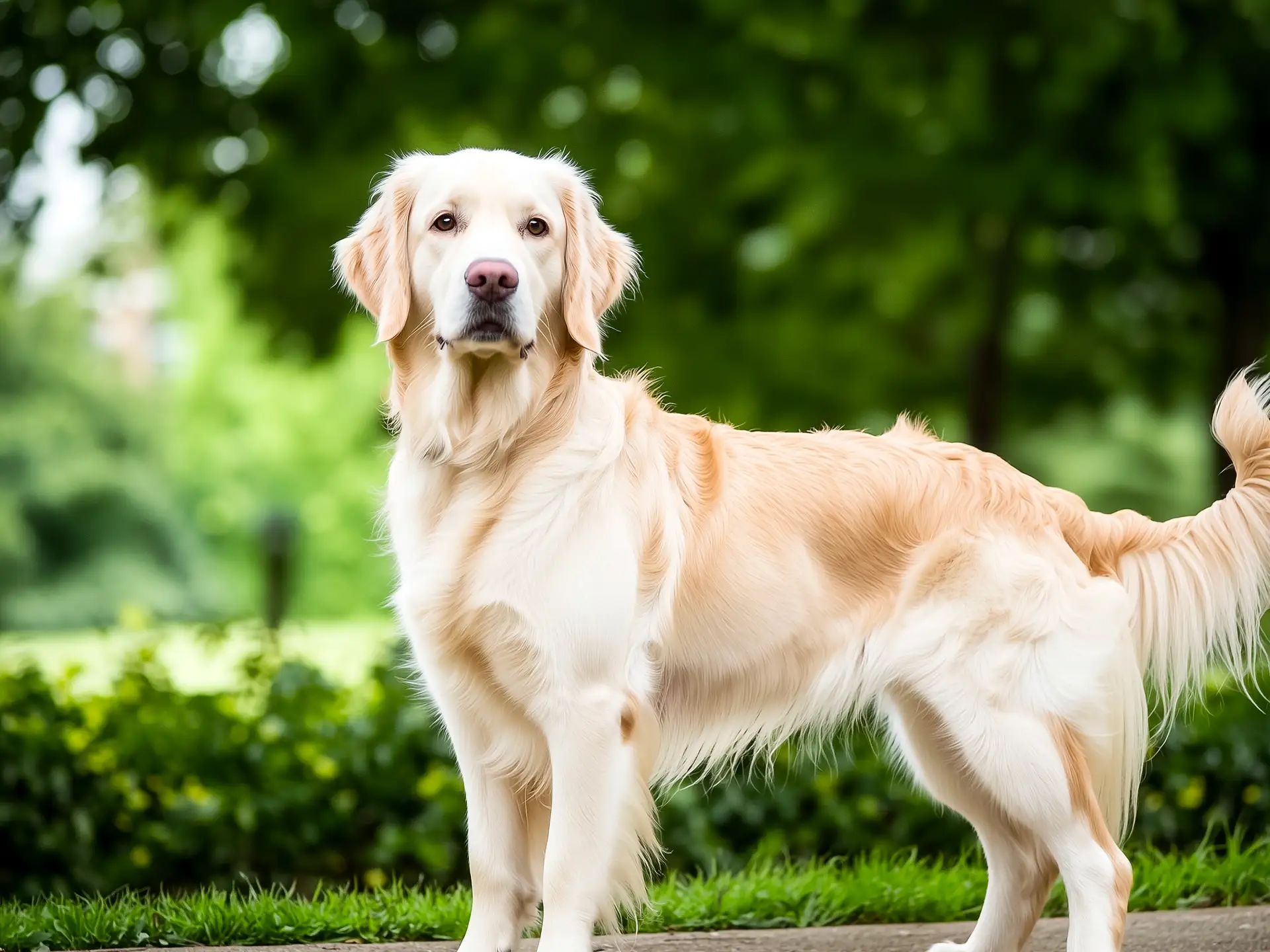English Cream Golden Retriever Dog Breed Info & Overview
The English Cream Golden Retriever is like a warm hug wrapped in a lustrous pale coat and soulful eyes. Known for their gentle and friendly nature, these beautiful dogs are as heartwarming as they are eye-catching. Intelligent and deeply loyal, English Cream Golden Retrievers make ideal companions for families seeking a devoted friend who brings both love and joy to every day.
Characteristics
Pictures
Breed History
The English Cream Golden Retriever is a regal dog with humble beginnings in 19th-century Scotland. It all started with Lord Tweedmouth, a Scottish noble with a dream of the ideal hunting dog. By crossing a yellow Flat-Coated Retriever with a now-extinct Tweed Water Spaniel, he created a dog perfect for the wet, rugged Scottish landscape. That early vision laid the foundation for the Golden Retriever as we know it today.
Golden Retrievers quickly gained popularity across England, admired for their skill, loyalty, and gentle temperament. Within this growing breed, lighter cream-colored coats emerged in the English lines, becoming especially prized for their unique beauty and calm nature. These “English Cream” variations embodied both work ethic and elegance, making them popular companions for hunters and families alike.
While they share a common ancestry with other Goldens, English Cream Golden Retrievers stand out with their pale coats and stockier frames—a look favored in the UK breed standards. Their journey from rugged fields to beloved family members showcases the versatility and enduring appeal of this gentle, intelligent breed.
Temperament, Personality
If you’re looking for a dog with a heart as big as its paws, look no further than the English Cream Golden Retriever. Known for their sweet, gentle nature, these dogs form deep bonds with their human families, showering them with affection and loyalty. Their friendly and approachable personality makes them a hit with kids, adults, and other pets alike.
This breed is famously patient and gets along well with children, often tolerating the occasional tug or cuddle with grace. They love being part of the action, whether it’s a game of fetch or a family gathering. Their calm demeanor and natural adaptability make them great companions for families of all shapes and sizes.
When it comes to strangers, an English Cream Golden will likely greet them with a tail wag and a welcoming smile. They’re more likely to offer a warm hello than a growl, making them ideal for social families but less suited for guarding duties. Their natural friendliness and open-hearted nature make them truly lovable companions.
Physical Characteristics
One of the standout features of the English Cream Golden Retriever is, of course, its luxurious cream-colored coat. Dense and water-repellent, this coat is both beautiful and functional. These dogs are slightly stockier than their American cousins, boasting a solid, muscular frame that’s well-suited for both work and play.
Their eyes are dark and expressive, exuding warmth and intelligence. With a broad head, short ears, and a friendly expression, these dogs have a face that seems to smile. Standing between 22 to 24 inches tall and weighing between 55 to 75 pounds, they’re large but never clumsy, moving with a graceful, steady gait.
Their build is both powerful and elegant, with a full tail that often wags in delight. English Cream Goldens possess a unique blend of strength and beauty, making them a joy to behold and a treasure to have around.
Health Issues
The English Cream Golden Retriever is a generally healthy breed, but like any dog, they’re prone to certain genetic issues. Hip and elbow dysplasia are common in this breed, and regular vet check-ups, along with a healthy weight, can help manage these conditions. Early detection through screening is key to preventing long-term discomfort.
Eye conditions, such as cataracts and progressive retinal atrophy, may also affect them. Regular eye checks are important to catch any issues early and ensure a lifetime of healthy vision. Routine screenings and working with reputable breeders can reduce the likelihood of these issues.
Cancer is a significant health concern in Golden Retrievers, including the English Cream variety. Owners should keep an eye out for unusual lumps or changes in behavior. A balanced diet, regular exercise, and good veterinary care contribute greatly to keeping your English Cream Golden healthy.
Grooming Needs
That gorgeous coat doesn’t stay flawless on its own! English Cream Golden Retrievers need regular grooming to keep their fur looking fresh and healthy. A thorough brushing two to three times a week is ideal for managing shedding and keeping their coat tangle-free. During peak shedding seasons, daily brushing may be helpful.
Bathing can be done every couple of months or as needed, but over-bathing can strip their coat of natural oils. A gentle, dog-specific shampoo will keep their skin and coat healthy. Regular ear checks are also important, as their floppy ears can trap moisture, leading to infections.
Don’t forget about dental hygiene and nail care—regular brushing and monthly nail trims are essential for their overall health. A consistent grooming routine keeps your English Cream looking and feeling great, inside and out.
Exercise Requirements
Bred for the outdoors, English Cream Golden Retrievers have energy to spare! This active breed needs regular exercise to stay happy and healthy, ideally around one to two hours each day. Activities like swimming, fetch, or a long hike are perfect for channeling their energy and engaging their keen intelligence.
They love to have a purpose, so adding interactive play or agility training to their routine will keep them mentally stimulated as well. A happy Golden is one that’s physically and mentally engaged, so mix it up with new games and challenges.
Without enough exercise, they may become restless and turn to less desirable activities like chewing. Keeping them active and involved prevents boredom and strengthens your bond with this joyful companion.
Training Tips
The English Cream Golden Retriever is a star student, eager to please and quick to learn. Positive reinforcement, with treats and praise, goes a long way with this sensitive breed. Their intelligence and eagerness make them highly responsive to training, though patience and consistency are key to keeping them focused.
Early socialization and obedience training set the stage for a well-behaved adult dog. Introduce them to a variety of environments, people, and other animals to build confidence and adaptability. Enrolling in puppy classes can be a great start, offering structure and social opportunities.
Harsh methods are unnecessary and can backfire with this gentle soul. Kindness and encouragement bring out the best in them, making training a rewarding experience for both of you.
Nutrition, Diet
Feeding the English Cream Golden Retriever a nutritious, balanced diet is essential for their health. Puppies need food formulated for growth, while adults benefit from a diet rich in protein to support their active lifestyle. Portion control is important, as Goldens are prone to weight gain—typically, they’ll need 2.5 to 3.5 cups of dry food daily, split into two meals.
Omega-3 fatty acids are a great addition to their diet, promoting a shiny coat and healthy skin. Avoid overfeeding treats or table scraps, as even a little extra can add up. Consult with a veterinarian to create a diet that meets your dog’s unique needs, keeping them in peak condition.
Fresh water should always be available to keep them hydrated, especially during play or exercise. A healthy diet fuels their energy and keeps their radiant coat looking its best.
Adoption, Breeders
If you’re considering an English Cream Golden Retriever, look for reputable breeders who prioritize health and temperament. Health screenings for common genetic issues, like hip dysplasia, are essential to ensure a healthy puppy. Visiting the breeder’s facility offers insight into their practices and the environment in which the puppies are raised.
Adoption is a wonderful option, too. Rescue organizations dedicated to Golden Retrievers often have this beautiful variety available. Adopting an older dog offers a second chance and can be incredibly rewarding. Websites like the Golden Retriever Club of America and Adopt a Pet provide resources and referrals.
Finding the right breeder or adoption center helps you welcome a healthy, happy dog into your family.
Family Pet?
The English Cream Golden Retriever is a fantastic choice for families of all kinds. Their gentle nature makes them wonderful with children, and their playful spirit ensures they’re ready for all kinds of family activities. They thrive on human companionship and love to be part of the family action.
With proper introductions, they get along well with other pets, thanks to their easygoing nature. Their patience and kindness make them a natural fit for homes with cats or other dogs. Early socialization sets the stage for peaceful cohabitation with other animals.
Their adaptability allows them to fit into busy or calm households alike. Whether you’re out exploring or enjoying a quiet night in, the English Cream Golden is thrilled to be by your side.
Right For You?
If you’re searching for a dog who’s intelligent, affectionate, and stunningly beautiful, the English Cream Golden Retriever may be the one for you. They suit active individuals or families who can meet their exercise and companionship needs. First-time dog owners often find them manageable with the right training and dedication.
This breed’s happy-go-lucky attitude makes them great outdoor partners, perfect for hikes, swims, or leisurely strolls. However, they do need time and attention, so consider if you can provide the activity and grooming they require.
If you’re prepared for the commitment, you’ll gain a loyal friend who brightens every day with their love and joy.
Conclusion
The English Cream Golden Retriever combines beauty, brains, and a gentle heart, making them an ideal companion for families, singles, and seniors alike. With their easygoing nature and loyal spirit, they bring happiness to everyone they meet.
Be ready to provide the exercise, grooming, and love they need, and you’ll have a lifelong friend who repays you with endless affection and joy. With an English Cream Golden Retriever, every day is a little brighter and every adventure a little sweeter.
FAQs
-
Do Dutch Shepherds need a job to stay happy?
Yes, Dutch Shepherds thrive with purposeful tasks or jobs. They’re natural workers and benefit from activities like agility, obedience, or scent work to stay mentally and physically engaged, helping prevent boredom-related behaviors.
-
What’s the best way to introduce a Dutch Shepherd to new environments?
Gradual exposure is key. Dutch Shepherds adapt well but may need structured introductions to busy environments. Start with quieter settings, rewarding calm behavior, before gradually introducing them to louder or busier places.
-
How do Dutch Shepherds handle extended periods indoors?
Dutch Shepherds can stay indoors for limited periods, but extended indoor time without stimulation can lead to restlessness. Interactive toys, puzzle feeders, and brief training sessions help keep them mentally active when confined indoors.
-
Do Dutch Shepherds have specific dietary needs due to their activity level?
Yes, Dutch Shepherds often need a high-protein diet to support their energy demands. Active individuals especially benefit from diets that include balanced fats and complex carbs for sustained energy and muscle health.
-
What are some lesser-known challenges of owning a Dutch Shepherd?
Dutch Shepherds can be intense and independent-minded, which may surprise new owners. They’re highly intelligent and require consistent training, making them a better fit for experienced owners familiar with strong-willed breeds.
Breed Ratings
The Dutch Shepherd is highly intelligent, making training enjoyable and allowing them to excel in complex tasks and dog sports.
They are playful and enjoy interactive games, which helps in bonding and keeping them mentally stimulated.
With a high energy level, the Dutch Shepherd requires daily exercise and mental challenges to stay happy and healthy.
Shedding is moderate to high, especially during seasonal changes. Regular grooming helps manage loose hair.
They have a strong prey drive due to their herding background, so supervision around small animals is advised.
Grooming needs vary by coat type, but regular brushing is necessary. Not the easiest, but manageable with routine.
Highly trainable due to their intelligence and eagerness to please. They respond well to positive reinforcement methods.
Dutch Shepherds prefer company and may develop separation anxiety if left alone for long periods.
They are moderately vocal and may bark to alert their owners but are not excessive barkers.
Low drooling levels make them relatively tidy compared to other breeds.
Can be friendly with other dogs if socialized early, but may exhibit territorial behavior without proper training.
Generally healthy with few breed-specific issues, but regular vet check-ups are important for maintaining good health.















